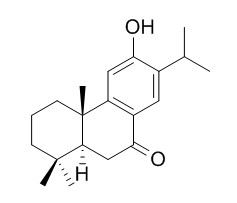Sugiol
Sugiol has antioxidant efficacy, it has significant scavenging activities of 1,1-diphenyl-2-picryl hydrazyl, nitric oxide, superoxide and hydroxyl free radicals. Sugiol's efficacy in inhibiting the inflammatory cytokines of IL-1beta and TNF-alpha could be attributed to a reduction of the ROS that leads to a decrease in the phosphorylation of MAPKs.
Inquire / Order:
manager@chemfaces.com
Technical Inquiries:
service@chemfaces.com
Tel:
+86-27-84237783
Fax:
+86-27-84254680
Address:
1 Building, No. 83, CheCheng Rd., Wuhan Economic and Technological Development Zone, Wuhan, Hubei 430056, PRC
Providing storage is as stated on the product vial and the vial is kept tightly sealed, the product can be stored for up to
24 months(2-8C).
Wherever possible, you should prepare and use solutions on the same day. However, if you need to make up stock solutions in advance, we recommend that you store the solution as aliquots in tightly sealed vials at -20C. Generally, these will be useable for up to two weeks. Before use, and prior to opening the vial we recommend that you allow your product to equilibrate to room temperature for at least 1 hour.
Need more advice on solubility, usage and handling? Please email to: service@chemfaces.com
The packaging of the product may have turned upside down during transportation, resulting in the natural compounds adhering to the neck or cap of the vial. take the vial out of its packaging and gently shake to let the compounds fall to the bottom of the vial. for liquid products, centrifuge at 200-500 RPM to gather the liquid at the bottom of the vial. try to avoid loss or contamination during handling.
Comput Biol Chem.2019, 83:107096
Biomolecules.2021, 11(10):1537.
Cell Rep.2022, 39(1):110643.
Industrial Crops and Products2018, 353-362
Exp Parasitol.2017, 183:160-166
Drug Dev Res.2022, 83(7):1673-1682.
BMC Complement Altern Med.2018, 18(1):303
China Pharmacy2015, 26(27)
Toxicol In Vitro.2023, 93:105667.
Viruses.2017, 9(10)
Related and Featured Products
Asian Pac J Trop Med. 2014 Jan;7(1):9-15.
Antioxidant, lipid peroxidation inhibition and free radical scavenging efficacy of a diterpenoid compound sugiol isolated from Metasequoia glyptostroboides.[Pubmed:
24418075 ]
To investigate the antioxidant efficacy of a biologically active diterpenoid compound Sugiol isolated from Metasequoia glyptostroboides (M. glyptostroboides) in various antioxidant models.
METHODS AND RESULTS:
An abietane type diterpenoid Sugiol, isolated from ethyl acetate extract of M. glyptostroboides cones, was analyzed for its antioxidant efficacy as reducing power ability and lipid peroxidation inhibition as well as its ability to scavenge free radicals such as 1,1-diphenyl-2-picryl hydrazyl, nitric oxide, superoxide and hydroxyl radicals. The Sugiol showed significant and concentration-dependent antioxidant and free radical scavenging activities. Consequently, the Sugiol exerted lipid peroxidation inhibitory effect by 76.5% as compared to α-tocopherol (80.13%) and butylated hydroxyanisole (76.59%). In addition, the Sugiol had significant scavenging activities of 1,1-diphenyl-2-picryl hydrazyl, nitric oxide, superoxide and hydroxyl free radicals in a concentration-dependent manner by 78.83%, 72.42%, 72.99% and 85.04%, when compared to the standard compound ascorbic acid (81.69%, 74.62%, 73.00% and 73.79%) and α-tocopherol/butylated hydroxyanisole (84.09%, 78.61%, 74.45% and 70.02%), respectively.
CONCLUSIONS:
These findings justify the biological and traditional uses of M. glyptostroboides or its secondary metabolites as confirmed by its promising antioxidant efficacy.
Planta Med. 2005 Apr;71(4):300-5.
Anti-inflammatory activity of sugiol, a diterpene isolated from Calocedrus formosana bark.[Pubmed:
15856404]
Sugiol is a diterpene which was isolated and purified from alcohol extracts of the bark of Calocedrus formosana Florin (Cupressaceae).
Although Sugiol has low inhibitory activity against the DPPH radical, it could effectively reduce intracellular reactive oxygen species (ROS) production in lipopolysaccharide (LPS)-stimulated macrophages.
METHODS AND RESULTS:
The present study investigated the potential anti-inflammatory activity of Sugiol, and the relationship between signal transduction and inflammatory cytokines in vitro. A dose of 30 microM of Sugiol was effectively inhibitory for proIL-1beta, IL-1beta and TNF-alpha production, suggesting that Sugiol is bioactive against inflammation. Moreover, Sugiol reveals a capacity for suppressing the activation of mitogen-activated protein kinases (MAPKs), including extracellular signal-regulated kinase (ERK), c-Jun NH2-terminal kinase (JNK), and p38 mitogen-activated protein kinase (p38) activated by LPS-stimulation in J774A.1 murine macrophages. A low dosage of 10 microM of Sugiol completely inhibited ERK1/2 phosphorylation, while 30 microM effectively inhibited JNK1/2 and p38 phosphorylation in LPS-stimulated macrophages. In addition, Sugiol significantly inhibited LPS-induced ROS production.
CONCLUSIONS:
Our studies suggest that Sugiol's efficacy in inhibiting the inflammatory cytokines of IL-1beta and TNF-alpha could be attributed to a reduction of the ROS that leads to a decrease in the phosphorylation of MAPKs.



